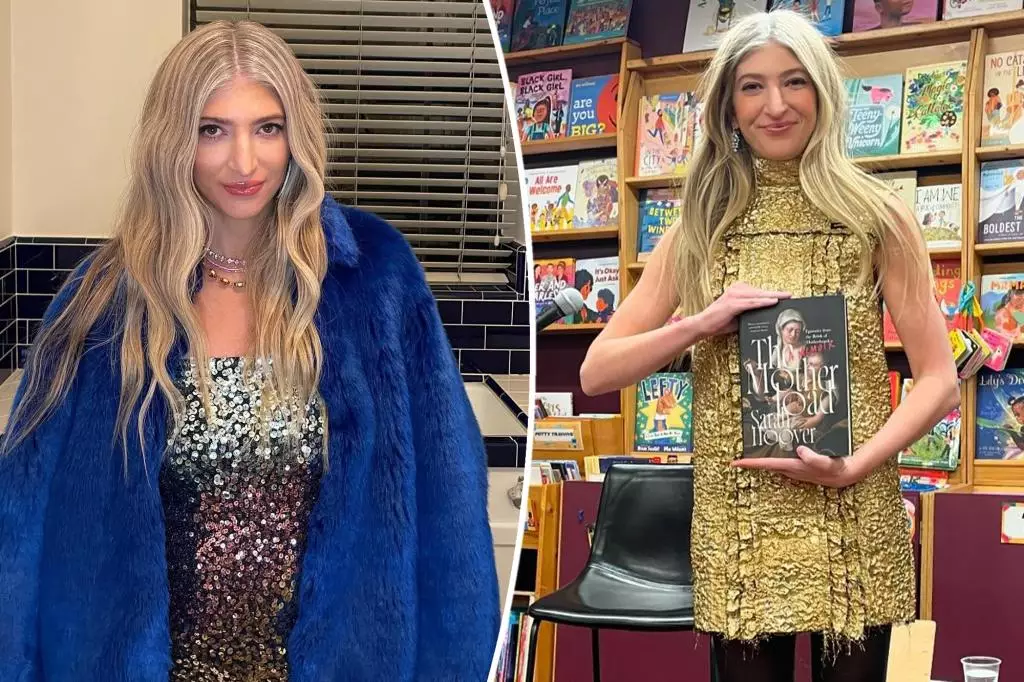In an era where personal stories often become public property, the line between creative expression and ethical responsibility can blur dangerously. The recent turmoil surrounding best-selling author Sarah Hoover and her estranged sister has ignited conversations that delve into the complexities of family dynamics, grief, and the memory-sharing practices of memoirists. Hoover’s book, “The Motherload,” which received acclaim upon its release, has transformed into a source of familial discord, as allegations arise that Hoover exploited intimate details of her sister’s traumatic experience surrounding a stillbirth.
The sister’s anguish is palpable, articulating her profound sense of betrayal through social media. She alleged that Hoover had previously assured her that any future narratives involving shared experiences would be shared with her explicit permission. The emergence of a three-page recounting of their overlapping tragedy, particularly given the public nature of Hoover’s memoir, has led to emotional fallout and shattered bonds. It is a stark reminder that even well-intentioned storytelling can lead to unintended consequences when it invades the private realms of others.
The Power and Pitfalls of Memoir Writing
As a memoirist, Hoover’s prerogative to narrate her own experiences is undisputed; however, the moral implications of recounting shared trauma raise profound ethical questions. The act of storytelling can be an incredibly healing practice for individuals processing grief, yet it demands a unique sensitivity—especially when those experiences are interwoven with the lives of others. In this case, the sister feels that she not only lost a sibling through Hoover’s public narrative but was also stripped of agency concerning her own story.
The crux of the issue lies in the blurred boundaries between personal truth and the truths of others who unwittingly become characters in someone else’s narrative. The sister’s claim that Hoover fabricated details, specifically about holding the baby—an experience she staunchly contests—adds another layer of complexity. It raises concerns about authenticity in storytelling: Are authors responsible for the accuracy of their recollections when those recollections inevitably involve other people and their memories?
Public Reactions and the Media’s Role
As the story unraveled, it captured the attention of a broader audience, with various media outlets jumping in to further sensationalize the family conflict. This raises an equally disconcerting question about the role of the press: How does the dissemination of such personal and sensitive information contribute to the distress of those involved? Coverage of Hoover and her book inevitably led back to her tumultuous relationship with her sister, further spotlighting an already painful situation.
A publicist for Hoover remarked that the issue is a “family matter,” suggesting an attempt to distance the author from increasingly harsh public scrutiny. Nevertheless, this incident has served as a catalyst, igniting a dialogue about the ethical responsibilities that come with writing about personal experiences, especially those that intersect with public life.
Persisting Relationships Amid Turmoil
The ramifications of Hoover’s memoir extend beyond immediate family conflict. The revelations posit a broader dialogue on the dynamics of relationships tested by the repercussions of public life. In a world where personal narratives can quickly become commodities, the emotional toll on those featured becomes a lesser-discussed aspect of celebrity culture.
The sister’s pain is not isolated; it is emblematic of a deeper cultural artifact regarding how stories are told. These misunderstandings—coupled with the global audience that literary successes attract—often overlook the emotional intricacies that govern intimate relationships. The potential for long-term estrangement raises questions about how shared histories can be seen as personal treasures or as fodder for commercial gain.
In a society that increasingly values openness and vulnerability, the fallout from Hoover’s memoir serves as a cautionary tale. Familial bonds can be fragile, and exposing intimate details can lead to irrevocable breaches of reconciliation. The lesson here is not just one of accountability but also one about understanding the profound impact that narrative choices have on the lives of others intimately involved in those narratives. Whether the art of memoir writing can evolve to protect vulnerable relationships remains to be seen, but it is a conversation ripe for exploration.

